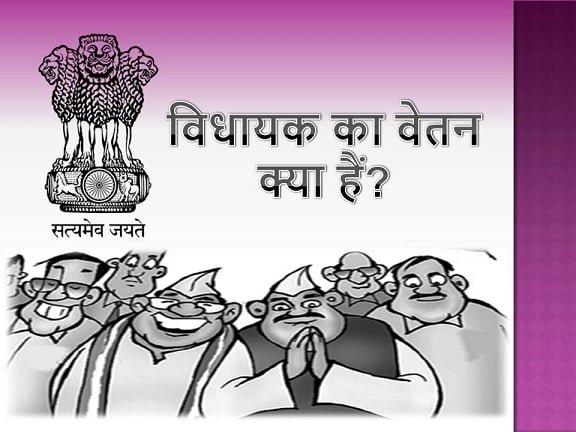Members of Legislative Assembly (MLA) [Salary, Pay Scale, Pension And Allowance] In States (Vidhayak ki salary kitni hoti hai)
It is rather difficult to manage the political governance of a nation as big as India. So, political categorizations come in handy to manage the activities and offer good governance. At the state level, we have the MLAs. Individuals who hold this post are called Members of the Legislative Assembly. To become an MLA, the person has to contest and win in state elections. It is mandatory for all states to have at least 50 members in the State Legislative Assembly. These political figures have some set roles for the development of their area.

Monthly Salary of the MLA
The salary of MLAs is not the same in all Indian states. The salary and other allowances are fixed by the state authority. Each state authority pays a different amount to the elected MLAs. The Indian state that pays the highest salary to MLAs is Telangana, and the state that pays lowest salary to the elected MLAs is Tripura. The annual remuneration of the MLAs varies depending on their monthly salaries, as fixed by the respective state. Here is the recent state-wise MLA salary list:
| Name Of The State | Monthly Salary For Elected MLAs |
| Telangana | Rs.2,50,000 |
| Uttar Pradesh | Rs.1,87,000 |
| Andhra Pradesh | Rs.1,30,000 |
| Delhi | Rs.2,10,000 |
| Maharashtra | Rs.1,50,000 |
| Himachal Pradesh | Rs.1,25,000 |
| Tamil Nadu | Rs.1,13,000 |
| Madhya Pradesh | Rs.1,10,000 |
| Haryana | Rs.1,15,000 |
| Jharkhand | Rs.1,11,000 |
| Chattisgarh | Rs.1,10,000 |
| Goa | Rs.1,00,000 |
| Punjab | Rs.1,00,000 |
| West Bengal | Rs.96,000 |
| Bihar | Rs.1,00,000 |
| Karnataka | Rs.60,000 |
| Gujarat | Rs.47,000 |
| Sikkim | Rs.52,000 |
| Rajasthan | Rs.40,000 |
| Kerala | Rs.42,000 |
| Odisha | Rs.30,000 |
| Uttarakhand | Rs.35,000 |
| Arunachal Pradesh | Rs.25,000 |
| Manipur | Rs.18,500 |
| Meghalaya | Rs.28,000 |
| Nagaland | Rs.18,000 |
| Tripura | Rs.17,500 |
| Assam | Rs.20,000 |
Other Perks and Allowances
Apart from the monthly salaries, the MLAs also receive money for meeting other expenses. They attain daily allowance for petrol cost. Apart from this, their official and leisure trips are also sponsored by state authority. Their personal office staffs are paid by the state authority. They also get medical facilities from the government. Evert elected MLA is entitled to attain special allowances to pay for housing, telephone and electricity bills.
Pension for Former MLAs
When any member retires from his MLA post, he/she is entitled to get a lifelong pension from the state government. The pension amount will depend on the last drawn salary. In case the former MLA passes away, his/her spouse will be receiving 50% of the pension as a family pension.
Who supervises the payment of salaries and allowances?
The central government does not play any part in the payment of salaries and allowances of the MLAs. It is the responsibility of respective state governments to deposit remuneration in the accounts of elected MLAs on time. All these records are maintained by the State Finance Department.
Role and Duties of the MLA
- Legislative powers – When it comes to making laws, the MLAs exercise their legislative powers. In case a bill does not receive the support of majority of the MLAs in the house, it will not be passes as a law.
- Financial powers – All financial decisions are taken by the legislative assembly. Without proper financial budget allocation, it will be impossible to pave the path for development of the entire state. MLAs get the budget sanctioned by the state authority, after they submit a detailed report of developmental activities, in their respective legislative area.
- Electoral powers – When it is time to pick the President of the nation, elected MPs and MLAs get to discharge their electoral duties. They vote for selecting the next President.
- Executive powers – The success of all schemes depends on their proper implementation. It is here that MLAs discharge their executive powers. They need to ensure that all eligible beneficiaries are getting the promised perks. Apart from this, MLAs also ensure that government departments are doing their part responsibly.
- Constructional powers – The Indian Constitution suggest that some of the state laws can be altered, according to the need, if the bill has the consent of at least 50% of the elected MLAs in the state legislative assembly.
It is not possible for the Chief Minister of every state to keep a personal watch on what is happening in each district. Elected MLAs act as the bridge to relay information from the people to the authority. Proper remuneration will offer these individuals the boost to work more for the betterment of their legislative area.
Other Articles